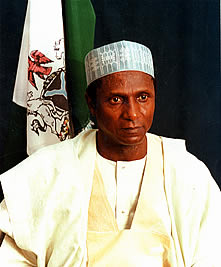Nigeria - President Umaru Yar'Adua used his inaugural address Tuesday to appeal for an immediate end to the violence that has slashed crude production in Nigeria's oil heartland, and the largest militant group said it would consider the overture. The prospect of increased output for Africa's biggest oil country and a major U.S. supplier sent prices down on international markets. Yar'Adua's unusually conciliatory overture highlighted the challenge that oil-related violence poses as he struggles to establish legitimacy after an April election victory denounced as fraudulent by the opposition and called not credible by international observers. It was in sharp contrast to his predecessor, Olusegun Obasanjo, who considered the militants simple criminals. In his farewell address Monday, Obasanjo didn't even mention the southern oil region and the 18 months of attacks on the oil industry that have cut output by a third. |
|
|---|---|
The 56-year-old Yar'Adua, who had Obasanjo's support in the election, used his first speech as president to say the impoverished Niger Delta's troubles needed "urgent attention" and he promised to act quickly to address them. "In the meantime, I urge all aggrieved communities, groups and individuals to immediately suspend all violent activities and respect the law," he said. "Let us allow the dialogue to take place in a conducive atmosphere." The Movement for the Emancipation of the Niger Delta, which is the biggest militant group in the delta and previously insisted it would not lay down arms until the government met its demands to improve conditions in the region, said it would study the new president's appeal. "We are considering this request," a spokesman said in an e-mail to The Associated Press. Militant groups in the delta say their violence is aimed at forcing the federal government to funnel more oil revenues to the Niger Delta. The government gets the vast majority of its revenue from oil, and many Nigerians complain that corrupt officials siphon off much of the money. In taking the oath of office before Chief Justice Idris Kutigi, Yar'Adua pledged to uphold Nigeria's unity and pursue its best interests. He addressed the election controversy head on, agreeing there were flaws in the voting, during which thugs openly sold ballot papers and intimidated voters. He said he would reform Nigeria's electoral system. "We acknowledge that our elections were not perfect and had lapses and shortcomings. However, we have well established legal avenues of redress and I urge anyone aggrieved to pursue them," Yar'Adua said to applause. "I also believe that out experiences represent an opportunity to learn from our mistakes. Accordingly, I will set up a panel to examine the entire electoral process with a view to effect reforms and ensuring that we raise the quality and standards of our general elections to meet international standards." Earlier in the day, soldiers and police set up roadblocks and patrolled streets in volatile districts of Nigeria's biggest city, Lagos, saying opposition leaders would not be allowed to hold a planned protest of the inauguration. But hundreds of protesters still gathered near the headquarters of the Nigeria Labor Congress as labor and democracy activists denounced the inauguration. Riot police cordoned off the area and would not let the protesters into adjoining streets. Obasanjo's 1999 election ended decades of near-constant military rule in Africa's most populous nation, including a particularly brutal 15-year phase that began in 1984. Yar'Adua said his assumption of power after eight years under Obasanjo was an "historic milestone" for this restive nation of 250 ethnic groups and 140 million people, almost equally split between northern-based Muslims and southern Christians. "We have at last managed an orderly transition from one elected government to another," he said. All other attempts since 1960 independence from Britain were undermined by coups d'etat or annulments of election results. Even though the end of military rule unleashed long-simmering conflict that has killed some 15,000 Nigerians in political violence, Nigerians are more unified, Yar'Adua said. Under civilian rule, Nigerians say they have gained freedoms and their country has shaken its reputation as an international pariah run by generals bent on looting the public coffers. Obasanjo also cleared the country's books of billions of dollars of debt racked up by military rulers and helped end at least two of West Africa's civil wars by sending troops to intervene. But many Nigerians say graft continued to flourish under Obasanjo and services like electricity and water supply worsened. The vast majority of the country's people live in poverty, while a largely corrupt political and business elite has grown. Yar'Adua promised to build roads and power plants, fight corruption, create jobs and keep inflation and interest rates low to attract foreign investment. "Let us now join together to build a society worthy of our children," he said.
|
